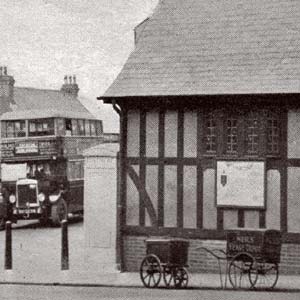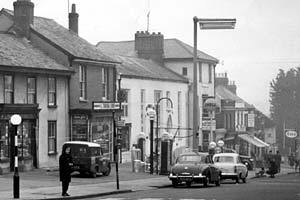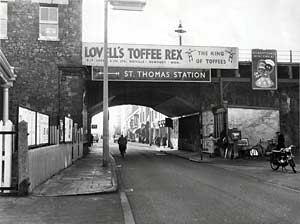
Exeter Stories
Exeter folk and friends in their own words - 1890's to the 1990's │ << Previous story │ Next story >> │
Peter Hinchliffe - characters, places and shopping in the 50s and 60s
Town Porters
My wife was in business with a chap called Reginald Metcalf who before the war was a representative for Debenhams, who then were wholesalers of women’s fashions and cloth. From about 1930, he travelled the south and west for the company, and for most of that decade, long distance car travel between towns was not really feasible, so most 'Commercial Travellers' went by train.
On arrival at either Central or St Davids station, his boxes of samples would be taken into the left luggage store, he would go to the Queens Hotel in Queen Street where he stayed for a few days. Either at the station or en route to the hotel, he would look out for a porter, a man with a large barrow. If none were about he would tell the receptionist at the Queens of his requirement for a porter the following day. Next morning one would appear, either summoned by the hotel or one had called looking for work.
Apparently porters were not difficult to find at the rear of the bigger shops in town, where they waited with their hand cart to take goods home for customers, a 3 piece suite down to St Thomas, or a wardrobe to Whipton. A piano to the top of Pennsylvania must have been a challenge!
When the porter was found, he was hired for whatever number of days were required, the porter went to the station to get the goods and he would meet Reg at the various shops in the City where he was trying to sell his wares. The porter walking and pushing his barrow to Exmouth, waiting all day, sleeping there with the barrow, and being in Sidmouth next day was the norm.
Being a porter must have been a precarious business, they were self employed in a hand to mouth fashion. Reg would pay the porter ten shillings (50 pence) for a day in Exeter, 12/6 to 15 shillings for a day outside the city, the half crown tip (12½ pence) at the end of the week would ensure his popularity
'Willie the Transport Manager'
The last porter I remember was still pushing his barrow in the 1960s. In the main he worked for an Irishman called Paddy Lawler who ran a 'junk shop' in a hut by the railway bridge in Cowick Street, Paddy referred to his porter as 'Willie the Transport Manager'.
Whilst serving in the police we often saw Willie delivering items. I once met him near Cowley Bridge, he was struggling with a bicycle which was loaded with a wardrobe that he was pushing out to Crediton. A relatively easy day for him, having delivered the wardrobe, he could cycle home.
On another occasion I remember Willie going down Fore Street with a load of furniture including a piano on the barrow, he was in front between the shafts, trying to stop the handcart running away with the load. He was fighting a losing battle, his strides became longer and longer as the hill became steeper, finally a leg of the barrow struck the kerb, it overturned, throwing Willie, the furniture and piano into the road near Bartholomew Street. With P C Malcolm Gardener, who happened to be nearby, we helped Willie reload the handcart. Later, when I saw Paddy, he told me that the piano on arrival at his emporium, was out of tune, he tried to blame Malcolm and me, suggesting that it was our inexperience in handling musical instruments that had led to the piano being less than concert pitch!
Shopping in Exeter
I recall that most grocery shops were equipped with chairs in front of the counter so that 'Mother' could sit down while she considered and composed her shopping list, when all the selection was made it was packed and delivered to the house.
Most grocery and butchers shop offered a delivery service, some shops had a van for this but the majority used boys, after school and on Saturdays. The boys were equipped with a carrier bike to cycle to the customers houses.
This style of shopping gradually declined with the introduction of 'help yourself' style stores. The first to arrive in Exeter was a shop called Watts at 141 Sidwell Street, it was hugely popular. At that time all shops closed between 5 and 6pm, many closed for half a day on Wednesday and none were open on Sunday. The revolution of help yourself gathered momentum, soon most shops became supermarkets, deliveries of groceries gradually died out.
The observance of half day closing continued in to the 1960s, the majority of High Street shops, such as Marks & Spencers, Colsons, Waltons and the Co-op, closed on Wednesday afternoon at 1 p.m.
For the recreation of the male staff from the shops, there was a local Exeter Wednesday League, supported by teams of men free on a Wednesday afternoon, e.g. Co-op United, City Transport, Police, Devonshire Regiment etc etc There were still enough butchers shops in the 60s to support a team in the league, imaginatively called 'Exeter Butchers!'
Whilst at school I had a job with Eastmonds the butchers, I worked in several of their branches, they had at least 9 different shops in Exeter at that time. The last traditional grocery shop offering home delivery, was Notts in Fore Street, Topsham, which closed in 2002.
Transport of Goods
Until the Rail Strike of 1957, and in consequence of it, 'the Beeching Report', British Railways were the “common carrier” of any freight that needed to be moved about the country. They provided a service, any parcel could be sent to any station on the system, for an additional charge, they would deliver the parcel to its destination by road.
At first they used horse drawn transport for the road deliveries, but in 1934 a motor company called Scammell built an articulated lorry called a “mechanical horse”
The Goods department at St Davids had a number of the lorries and they were a common site in the streets of Exeter making deliveries. Businesses around the city who had goods to despatch to other parts of the country, would put a sign out “BR-CALL” on their building, to advise the drivers to of an awaited collection.
Another feature of these vehicles was the driver’s dog, usually a noisy terrier that would be left in the back of the lorry to deter thieves.
For the more rural areas not served by the railway, bus companies also transported parcels. The Devon General busses had a series of agents in all the villages they served, each agent had a metal sign attached to their house, and the bus always stopped at the house if there were parcels to deliver. The bus conductors used to shout out the name of the bus stops, and it was common to hear the name of the village followed by the word 'agent' e.g. “Kenton agents”. The conductor leapt off the bus to deliver the parcel and parcels could also be left with the agent for onward transmission within the system
I recall that the Exminster Agent lived in one of the cottages opposite the shop which is now the Tesco store in that village
Thorns Garage, Heavitree
In late 1940s and early 50s many people had radios powered by accumulators - these were in reality, glass sided batteries in the form of a cube about 6 inches square, 9 inches tall and fitted with a carrying handle, and fairly weighty. One of our neighbours used to give me a few pence to take it to Thorns for re-charging, I think they charged 4 old pence for the charge, then the battery would power the wireless for about a week, bearing in mind of course there were only 2 programmes, the Home Service from about 8am to 10pm and the Light Programme from about 10am to 10pm.
Town or Country Electricity
“When I were a lad” if you went to buy an electric bulb, you were asked, “do you want it for town, or country” apparently they were slightly different voltages, I don’t know when 3 phase electricity became the norm, probably late 50s.
© 2007 Peter Hinchliffe
Peter Hinchliffe is a retired police officer.
 Two handcarts used by porters by the
Information Bureau in Paul Street.
The bus station is behind.
Two handcarts used by porters by the
Information Bureau in Paul Street.
The bus station is behind. Thorns Garage, Heavitree in the early 1960s. The white building next to
Thorns was Heavitree School before it moved to South Lawn Terrace.
Photo Den Perrin.
Thorns Garage, Heavitree in the early 1960s. The white building next to
Thorns was Heavitree School before it moved to South Lawn Terrace.
Photo Den Perrin. Paddy
Lawler's 'junk shop' is the
small building behind the motorcycle. Photo Express and Echo.
Paddy
Lawler's 'junk shop' is the
small building behind the motorcycle. Photo Express and Echo.
│ Top of Page │